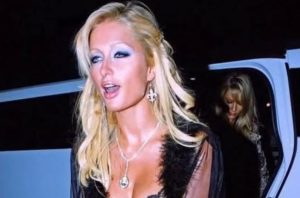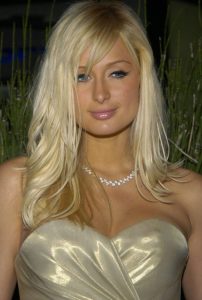For many Americans, the name Paris Hilton immediately brings to mind flashbulbs, pink velour tracksuits, paparazzi chases, and red carpet appearances. But beneath the surface of this glamorized lifestyle is a story of transformation, resilience, and reinvention that continues to shape modern pop culture. From her early days as a party-loving socialite to her current roles as a successful entrepreneur, DJ, and outspoken activist, Paris Hilton’s journey is far more layered than many might assume at first glance.

Born on February 17, 1981, in New York City, Paris Whitney Hilton was born into wealth, fame, and legacy. She is the great-granddaughter of Conrad Hilton, the founder of Hilton Hotels, a fact that placed her in the public eye before she ever actively sought the spotlight. Raised in both Los Angeles and Manhattan, Paris was a part of the American elite from the start. Her family’s connection to high society gave her early access to the world of fashion, fame, and luxury—experiences that would lay the groundwork for her future media empire.
In the early 2000s, Paris became a household name. Though she had previously done some modeling and appeared at high-profile events, her fame skyrocketed in 2003 with the premiere of the reality television series “The Simple Life.” Co-starring her best friend at the time, Nicole Richie, the show followed the duo as they left their lives of privilege to work blue-collar jobs and live with working-class families. The show’s contrast between their glamorous personas and the simplicity of rural life made for irresistible TV. It also gave birth to a new cultural archetype—the “celebutante”—a young woman famous primarily for her wealth and social life rather than any specific professional accomplishments.
Paris Hilton quickly became one of the most photographed and talked-about celebrities of the decade. Her personal life, fashion choices, and romantic relationships became constant tabloid fodder. Her signature catchphrases, particularly the infamous “That’s hot,” permeated popular culture. Critics dismissed her as shallow, yet she was unknowingly pioneering a new era of fame. She became the prototype for modern-day influencers, using media exposure as currency before Instagram and TikTok existed.
While Paris was often portrayed as a frivolous party girl, she was quietly building an empire. Her savvy understanding of branding allowed her to launch an expansive line of perfumes, handbags, clothing, shoes, and beauty products. Paris wasn’t just licensing her name; she was deeply involved in the design and marketing of her products, which went on to generate billions of dollars in global revenue. By the mid-2000s, she had redefined what it meant to be a celebrity entrepreneur. Her success demonstrated that there was real power in personal branding—and she wielded it like a pro.
In 2006, Hilton expanded her reach into music with her debut pop album titled “Paris.” The album featured the hit single “Stars Are Blind,” which surprised critics with its commercial success and catchy reggae-pop sound. The song charted globally and earned Paris a new level of legitimacy in the entertainment world. That same year, she appeared in films such as “House of Wax” (2005) and took on several television cameos. Though not every role garnered critical acclaim, they helped her stay relevant across multiple entertainment platforms.
But behind the scenes, life wasn’t as effortless or glamorous as it seemed. Paris began to experience the darker side of fame. The constant scrutiny, the invasive paparazzi, and the endless judgment took a toll. Her public persona—blonde, carefree, aloof—became a burden. She was living out a caricature of herself and began to feel the weight of public misconception. For years, she stayed silent, playing into the character that the media had created, but inside, she was yearning to be seen and understood for who she truly was.

That shift came to a head with the release of her 2020 documentary, “This Is Paris.” For the first time, the world saw a vulnerable, honest, and deeply introspective Paris Hilton. The film peeled back the layers of her public image and explored her traumatic experiences as a teenager, particularly her time spent in abusive behavior modification boarding schools. These institutions, marketed as therapeutic centers for troubled youth, subjected her to emotional, physical, and psychological abuse. Her decision to speak openly about this part of her life marked a turning point—not just for her public image, but for her personal healing.
The documentary was a revelation. Viewers who had only known Paris as a reality TV personality were shocked to learn about the emotional and psychological challenges she had faced. For Paris, telling her story wasn’t just cathartic—it was empowering. It allowed her to reclaim her narrative and use her platform for advocacy. Since the release of “This Is Paris,” she has become an outspoken advocate for reform in the troubled teen industry, partnering with other survivors and lobbying for legislative change to protect at-risk youth.
This activism marked yet another reinvention in Paris Hilton’s multifaceted career. No longer content with being just a brand, a DJ, or a celebrity, Paris stepped into the role of changemaker. Her work has brought attention to an issue that often goes unnoticed, and her willingness to be vulnerable has helped break the stigma around trauma and mental health.

Even as she has taken on more serious endeavors, Hilton hasn’t lost her entrepreneurial edge. She continues to innovate in business, launching skincare lines, NFT collections, and technology investments. Her DJ career—often underestimated—has taken her to stages all over the world, including headlining slots at major music festivals. She has performed for crowds of tens of thousands, spinning sets that prove her dedication to mastering her craft. Far from a hobby, DJing has become a core part of her identity in recent years, showing the world that she’s more than just a familiar face from the tabloids.
Paris Hilton’s romantic life has also matured with her public image. In 2021, she married entrepreneur Carter Reum in a lavish yet intimate ceremony. The couple’s relationship represents a stark contrast from her highly publicized, often volatile past romances. Her marriage appears grounded and stable, and the birth of their child further anchored Paris into a new role: that of a mother. Her journey into motherhood has added another layer to her ongoing evolution—demonstrating a softer, more grounded side that aligns with the personal growth she’s worked hard to achieve.
What’s perhaps most remarkable about Paris Hilton is her adaptability. In a cultural climate that often discards its icons as quickly as it elevates them, she has remained a constant presence. But her staying power isn’t due to luck. It’s the result of consistent reinvention, strategic thinking, and an innate ability to connect with different generations. Whether she’s lighting up the screen, spinning on stage, or testifying before lawmakers, Paris always brings an unmistakable authenticity that continues to resonate.

She’s lived under the microscope for over two decades, and yet, rather than fading into obscurity or being confined by her past, she has used each chapter of her life to write a more meaningful, expansive story. Today, she is no longer merely a symbol of excess or early 2000s nostalgia—she is a business powerhouse, a creative force, and a voice for those who have felt silenced.
There’s a powerful lesson in Paris Hilton’s transformation. It’s about the resilience to evolve, the courage to speak your truth, and the vision to turn criticism into currency. It’s about growing past assumptions and choosing to show up as your real self, even when the world expects a persona. She has shown that reinvention is not about losing who you are—it’s about reclaiming it.
Looking back, Paris Hilton’s impact on pop culture can’t be overstated. She helped usher in the influencer era, long before social media influencers became mainstream. She proved that reality TV could be a launchpad for legitimate success. And she demonstrated that image, when carefully cultivated, could be as powerful as any traditional career path.

But perhaps her most lasting legacy will be her voice—one that now speaks not just for herself, but for countless others who have experienced pain, trauma, and misrepresentation. Her story is a reminder that beneath the glamor, the memes, and the reality TV re-runs is a woman who refused to be boxed in, a woman who chose to grow, and who continues to redefine what it means to be iconic.
Paris Hilton’s evolution is still ongoing. She’s not done telling her story. And if there’s one thing her life has taught us, it’s this: never underestimate a woman who knows her worth.



